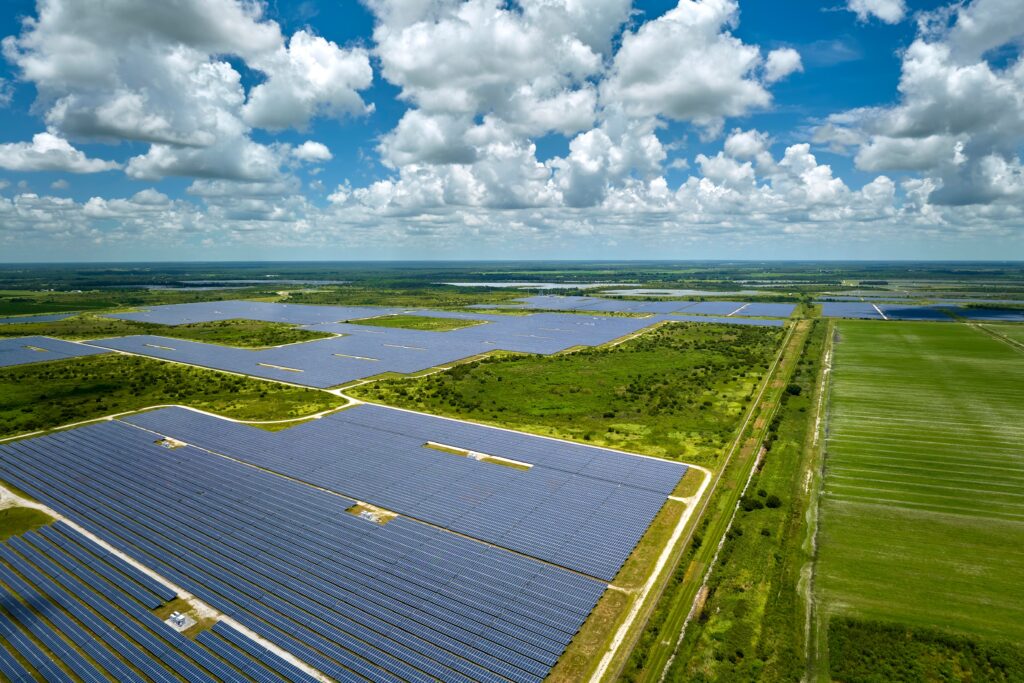
The new green-energy powered government has set the precedent for solar developments following the recent approval of large solar farms in both Lincolnshire and Cambridgeshire. The dual priority of sustainability alongside economic growth within Labour’s manifesto may lead to conflicting outcomes when it comes to policy. However, where food security fits into all of this is yet to be seen as farming may take a back foot in the race to reach net zero.
Solar farms have long been a contentious topic within the agricultural industry due to claims that their development will affect long-term arable land and therefore impact food security. The speed at which Ed Miliband, Secretary of State for Energy Security and Net Zero (DESNZ), has approved plans in both Lincolnshire and Cambridgeshire has sent shockwaves through local rural communities. Whilst a landslide majority may lead to unanimity within the Labour government, a prioritisation of development over farming may cause a landslide of backlash within rural communities.
The direct top-down approach which Miliband has taken on solar energy overlooks the more complex case-by-case analysis that is required to ensure farmland is not unnecessarily developed on. A CPRE report found that, ‘almost 14,500 hectares of the country’s best agricultural land been permanently lost to development since 2010.’ The clear prioritisation of development in both housing and green energy within the new Labour government is likely to lead to further loss of arable land. Calls for sequential testing for each proposed green field site have so far been largely ignored by Miliband as the speed at which he has pushed through three solar developments alludes to the low level of analysis undertaken by the new secretary of state for DESNZ.
Whilst a loss in potential crops may initially reveal itself as a cut to growth for farmers, the potential diversification of income solar developments generate allows a more consistent income stream for farmers. Installation of solar panels not only produces profit through the sale of energy to the grid, itcould also cut energy costs for farmers, thereby increasing profit margins. The NFU’s President Tom Bradshaw offers an optimistic view on the issue as he asserts, ‘solar farms offer an attractive diversification income opportunity for farmers.’ If developed on lower agricultural land, the economic benefits of solar farms may outweigh the environmental costs.
However, the recently approved development in Sunnica, Cambridgeshire is proposed to build onarable land which currently produces 32,000 tonnes of food each year. Indeed, the newly approved solar development goes against previous recommendations of its own planning inspectorate, sending a clear message that delivering on energy and development promises are this government’s sole priority.Whilst the government claims in its manifesto that ‘food security is national security,’ these recent approvals of solar farms suggest that an increase in threat to food security is to be expected in the coming years.
Not only do solar developments threaten food security, but local residents are also affected as signified by the recent rise of Nimbyism. This reaction is particularly pronounced in the rural communities where the rapid approval of solar farms have been approved, sparking significant opposition. Residents in the Cambridgeshire area are concerned about a potential, ‘industrialisation of the landscape,’ and loss of , ‘high-value crops.’ To mitigate these issues, it is crucial for the Labour Government to balance their new plans for renewable energy with the concerns of rural populations.
The new government’s prioritisation of renewable energy and development, while laudable, risks alienating rural communities and exacerbating food security threats. Whether the concerns of the agricultural community and local residents are taken into consideration in future planning developments is yet to be seen. It is certain however, that Labour will not be holding back when it comes to their plans on development.
To keep up to date and informed on our plans please enter your email below.